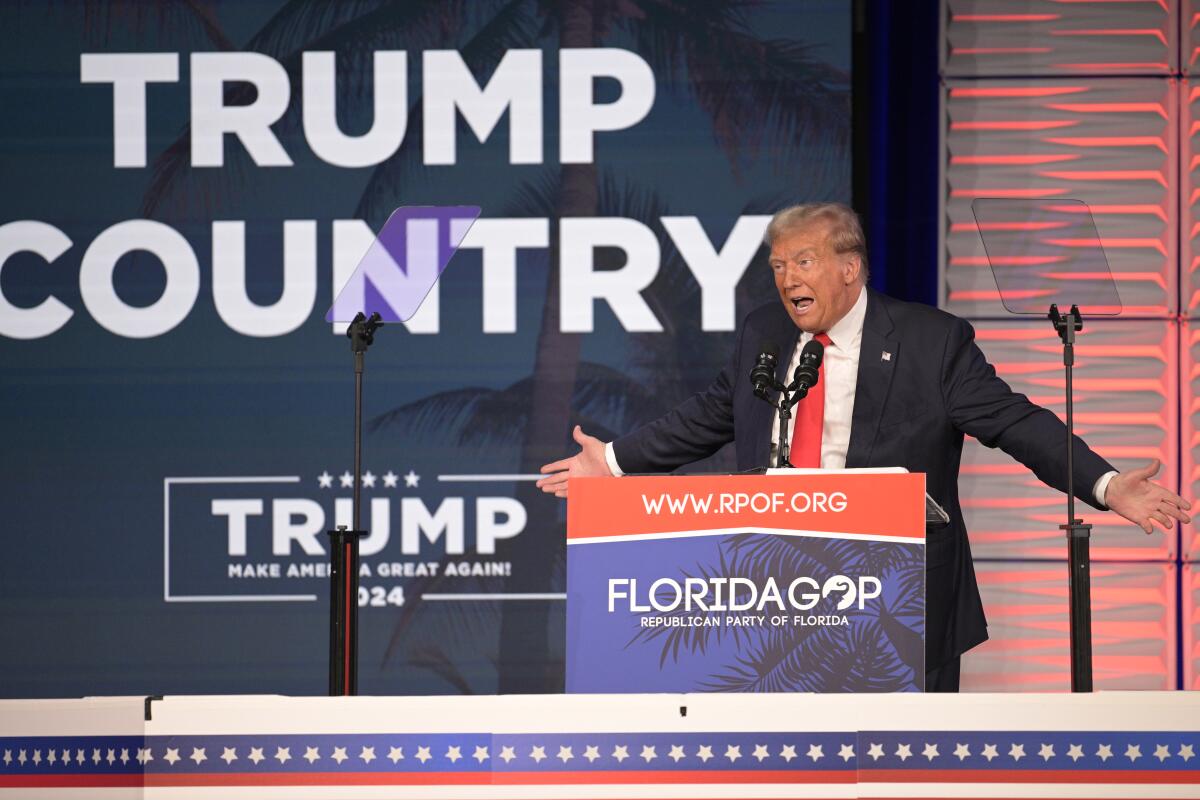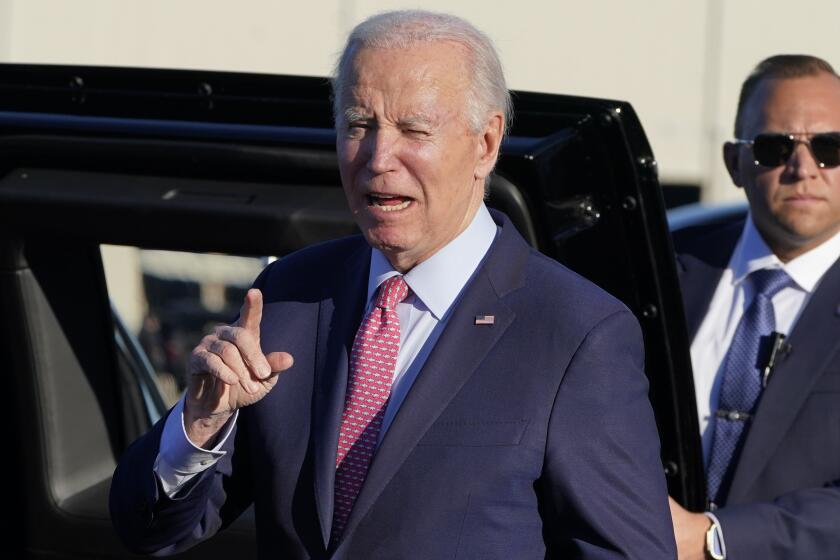Trump’s campaign in 2016 was a populist revolt. In 2024, it’s a quest for retribution

- Share via
WASHINGTON — The question to former President Trump last week was a softball, served up as an opportunity to rebut his critics.
“They want to call you a dictator,” Sean Hannity told him at a Fox News town hall. “Do you in any way have any plans whatsoever, if reelected president, to abuse power, to break the law, to use the government to go after people?”
Most candidates would have assured voters that they wouldn’t. Not Trump.
“You mean like they’re using [it] right now?” he replied, referring to the Biden administration. “I got indicted four times.”
Hannity gave him another opening:
“I want to go back to this one issue, because the media has been focused on this and attacking you. Under no circumstances, you are promising America tonight, you would never abuse power as retribution against anybody?”
“Except for Day 1,” Trump said. “I want to close the border, and I want to drill, drill, drill,” he added, not answering the question.
The president’s problem with young voters isn’t as dire as some recent surveys have indicated, a major new poll of young Americans shows. But the level of disenchantment is still serious, and lowered turnout is a significant risk for Democrats.
Leave aside whether Trump tacitly admitted that he hopes to rule as a dictator — although every time he expresses admiration for Russian President Vladimir Putin and Chinese President Xi Jinping, he sure sounds as though he’d like to.
On Day 1 of a second Trump administration, it’s clear that he would try to unleash the powers of the federal government against his critics. He has said so himself.
Even in his first term, Trump wanted the Justice Department to act against his political opponents. “Where are all the arrests?” he demanded in 2020.
Now, after he has been impeached twice and indicted four times, his appetite for revenge has only increased.
“If you’re president again, would you lock people up?” Glenn Beck asked him in August.
“The answer is you have no choice, because they’re doing it to us,” Trump replied.
“If I happen to be president and I see somebody who’s doing well and beating me very badly, I say, ‘Go down and indict them,’” he told Univision in November.
Trump has called for investigations, indictments or jail for a long list of critics, including President Biden and his family; former President Obama; Democrats and some Republicans in Congress; retired Gen. John F. Kelly, his former chief of staff; his former national security advisor John Bolton; officials in the Justice Department, FBI and CIA; and members of the news media.
“I will appoint a real special ‘prosecutor’ to go after the most corrupt president in the history of the USA, Joe Biden, the entire Biden crime family, & all others involved with the destruction of our elections, borders, & country itself!” he wrote in a social media post last year.
When Trump first ran for president in 2016, his campaign — quaint as it sounds now — focused largely on populist-conservative policy ideas. He promised to stop illegal immigration by building a wall on the border with Mexico. He promised to stop terrorism by banning Muslims from entering the United States. He promised to revive manufacturing jobs by passing tax cuts and restricting trade. He promised to repeal and replace Obamacare.
He’s recycling most of those promises this time, since he didn’t get them done in his first term. But they aren’t the heart of his campaign.
In speeches in Iowa and New Hampshire, Trump has derided Biden as “cognitively impaired,” denounced Democrats as “radical left thugs who live like vermin in the confines of our country,” and promised to “root out” anyone who stands in his way.
He unveiled his central theme in March, cloaking his quest for payback as a crusade on behalf of downtrodden supporters.
“I am your warrior. I am your justice,” he said. “And for those who have been wronged and betrayed, I am your retribution,” he said.
The prospect of a president who has promised to use federal law enforcement against his critics doesn’t worry only Democrats. Anti-Trump Republicans know they would be in the crosshairs too.
“Donald Trump has told us exactly what he will do,” former Rep. Liz Cheney (R-Wyo.) said last week. “If you have a president who is unwilling to abide by the rulings of the courts, who’s unwilling to uphold the Constitution, then there are no guardrails who can stop him.”
Sen. Mitt Romney of Utah, one of seven GOP senators who voted to convict the former president after he was impeached for trying to block the certification of Biden’s election, said there’s a political logic behind Trump’s theme.
“His base loves the authoritarian streak,” Romney told the Washington Post. “I think they love the idea that he may use the military in domestic matters and that he will seek revenge and retribution.”
A recent poll by the Public Religion Research Institute suggests that Romney is right. When voters were asked whether they think the country is “so far off track [that] we need a leader who is willing to break some rules,” most Trump supporters agreed.
Former Atty. Gen. William Barr warned that a second-term Trump would be even less restrained than before.
“I found in his first term that the only way to really talk sense into him was to say, ‘This is … going to hurt your reelection chances,’” said Barr, a Trump appointee. “I am concerned that, in the second term, he will be off the hook. There will be no way of controlling him, and he will also surround himself with yes men.”
Trump ducked his friend Hannity’s softball question last week. But in doing so, he only made it clearer that he will abuse his power if we give him a chance. He’s told us so himself.
More to Read
Get the L.A. Times Politics newsletter
Deeply reported insights into legislation, politics and policy from Sacramento, Washington and beyond. In your inbox twice per week.
You may occasionally receive promotional content from the Los Angeles Times.












